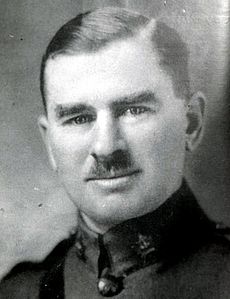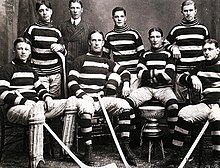Frank McGee (ice hockey player)
| Hockey Hall of Fame , 1945 | |
|---|---|
 McGee in Canadian Army uniform (1914) |
|
| Date of birth | November 4, 1882 |
| place of birth | Ottawa , Ontario , Canada |
| date of death | September 16, 1916 |
| Place of death | Courcelette , France |
| size | 167 |
| Weight | 68 |
| position | Center , rover |
| Shot hand | Left |
| Career stations | |
| 1903-1906 | Ottawa Hockey Club |
Francis "Frank" Clarence McGee (born November 4, 1882 in Ottawa , Ontario , † September 16, 1916 in Courcelette ) was a Canadian ice hockey player who is regarded as one of the best players before the founding of the National Hockey League . In his only four seasons, all of which he spent at the Ottawa Hockey Club , he demonstrated exceptional offensive qualities, so that the team not only won the Stanley Cup three times , but McGee also set goals in the Stanley Cup playoffs to this day put up.
From 1915 McGee took part in the First World War as a soldier , although he had already lost sight of his left eye in his youth. He was killed in the Battle of the Somme in 1916 . In 1945 he was among the first nine players to be inducted into the newly formed Hockey Hall of Fame .
family
Frank McGee comes from an influential family. His father was John Joseph McGee , who was Clerk of the Privy Council from 1882 to 1907, making it the highest civil servant in Canada. John Joseph McGee immigrated to Canada from Ireland in 1863 , following the wishes of his half-brother Thomas D'Arcy McGee , who in turn is considered one of the fathers of the Confederation . John Joseph McGee married Elizabeth Crotty, with whom he had six sons and three daughters. One of Frank's five brothers, James McGee , won the Stanley Cup with Frank and was also successful in Canadian football before he was killed in a riding accident in 1904.
Life
ice Hockey
After completing school in his hometown of Ottawa, McGee initially worked as an officer in the Department of Indian Affairs . In addition, he operated lacrosse , ice hockey and rugby at a high level, which he wore at the Ottawa Rough Riders as a half-back played and won the Canadian Rugby Championship with them 1898th In 1900, McGee got a Charity Hockey a puck in the face, making it in the left eye became blind . He then ended his active career for the time being and was henceforth active as a referee , where he soon missed the active game so much that he joined the Ottawa Hockey Club in 1903 . In January 1903 he made his debut for Ottawa against the Montréal AAA , the reigning Stanley Cup winner, and scored two goals in the 7-1 win.
In the years that followed, the Ottawa Hockey Club became the undisputed force in Canadian ice hockey. McGee's team won the Stanley Cup play-offs from 1903 to 1905 three times in a row, with the seven players being known as "Silver Seven" after their first win in 1903, as the club management gave them a silver nugget for each win gave. During this time McGee played on the center as well as on the rover position, while in the team with Alf Smith , Harry Westwick , Billy Gilmour and Tommy Smith four other players were represented, who were later inducted into the Hockey Hall of Fame . Despite his short stature, McGee was also considered a particularly tough player who "spends half of the game time lining the gang with opponents".
In total, McGee scored 63 goals in 22 play-off games, setting a record for the ages in one game in the 1905 series. The Silver Seven played against the Dawson City Nuggets and had already won the first game 9-2. However, the Nuggets' players described McGee's performance, who only scored one goal in the game, as unimpressive. In the next game, Ottawa won 23-2, with McGee scoring 14 goals, the highest number of goals ever in a Stanley Cup game. Since the Stanley Cup was already won with the second win, McGee also holds the record for the most goals in a play-off series with 15 goals. After the team had lost the 1906 play-offs against the Montreal Wanderers , McGee decided to end his career. In total, he scored 135 goals in 45 games in the regular season and play-offs and achieved an average of exactly three goals per game, with which only Dubbie Bowie can compete.
In 1945 he was posthumously inducted into the newly established Hockey Hall of Fame as one of the first nine players . Furthermore, in 1950, the “Silver Seven” were voted Canada's outstanding sports team of the first half of the 20th century by Canadian sports journalists. He has also been a member of the Ottawa Sports Hall of Fame since 1966 .
First World War
It is unclear how McGee was accepted into the Canadian Army with only one eyesight . The examining physician wrote on his report sheet that McGee could see with both eyes at the prescribed distance. According to his nephew's later testimony, he was said to have covered the blind eye with one hand in the examination in order to examine the healthy eyes for his ability to see, and when asked to cover the other eye, he simply changed hands instead of the eye. This narrative contradicts other representations which, due to McGee's fame in his home country, assume that the examining doctor knew McGee and must have known about his disability. In this context, it is assumed that the doctor let him exist because of his family origins, his reputation and his great sporting talents - he was considered the "epitome of Canadian masculinity" and had already proven himself to be a "fighter on the ice".
McGee was a member of the 43rd Regiment , the Duke of Cornwall's Own Rifles , and was established in May 1915 as a lieutenant of the 21st Infantry - Battalion sent by ship to England. During the First World War he suffered a knee injury in December 1915, and he was ordered back to England to recover. In August 1916 he returned to the 21st Infantry Battalion, although he was offered an office position in Le Havre , and subsequently died on September 16, 1916 in the Battle of the Somme .
literature
- William Houston: McGee, Frank . In: Dictionary of Canadian Biography . 24 volumes, 1966–2018. University of Toronto Press, Toronto ( English , French ).
Individual evidence
- ^ Stan Fischler, Shirley Fischler: Who's Who in Hockey . Andrews McMeel Publishing, Kansas City, 2003, ISBN 978-0-7407-1904-2 , pp. 260-261.
- ↑ a b en.mcgeesinn.ca: "History of McGee's Inn" (English, accessed December 23, 2014).
- ^ A b c d e f William Houston: McGee, Frank . In: Dictionary of Canadian Biography . 24 volumes, 1966–2018. University of Toronto Press, Toronto ( English , French ).
- ↑ a b c Joe Pelletier: Frank McGee on greatesthockeylegends.com (English, April 26, 2010, accessed December 23, 2014).
- ↑ a b c Nic Clarke: 'The Greater and Grimmer Game': Sport as an Arbiter of Military Fitness in the British Empire - The Case of 'One-Eyed' Frank Mcgee. In: The International Journal of the History of Sport, issue 28, number 3–4, March 2011, pp. 604–622, doi: 10.1080 / 09523367.2011.547320 .
- ↑ ottawasporthalloffame.ca: Frank McGee ( Memento from January 16, 2015 in the Internet Archive ) (English, accessed December 23, 2014).
| personal data | |
|---|---|
| SURNAME | McGee, Frank |
| ALTERNATIVE NAMES | McGee, Francis Clarence (full name) |
| BRIEF DESCRIPTION | Canadian ice hockey player |
| DATE OF BIRTH | November 4, 1882 |
| PLACE OF BIRTH | Ottawa , Ontario , Canada |
| DATE OF DEATH | September 16, 1916 |
| Place of death | Courcelette , France |

